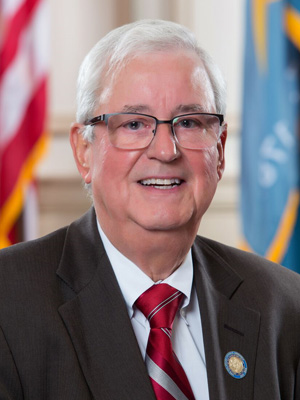2017-17
Calling on Regulators to Pay Special Attention to the Impact on Small Businesses when Enacting, Repealing or Amending Regulations

REPRESENTATIVE JOSEPH E. MIRO, CHAIR (DE) BUSINESS AND ECONOMIC DEVELOPMENT TASK FORCE
Sponsored by: Rep. Joseph E. Miró (DE)
WHEREAS, according to the Hispanic Businesses & Entrepreneurs Drive Growth in the New Economy report of 2015, Latinos own more than four million businesses in the United States, producing a revenue of $661 billion, and employing 2.3 million people in addition to their owners; and,
WHEREAS, according to the U.S. Hispanic Chamber of Commerce, Hispanic entrepreneurs started small-businesses at a rate 15 times above the national average in the last decade; and,
WHEREAS, a 2015 report by American Express showed that the number of businesses owned by Hispanic businesswomen tripled between 1997 and 2014, being the fastest growing population of business owners; and,
WHEREAS, Latinos are the youngest demographic in the United States, with a median age of 28, compared to 38 in the general population. Latino participation in the workforce is expected to rise significantly, and with more attending college, even more Latinos are likely to start their own businesses; and,
WHEREAS, small businesses in general employ half the private workforce in the United States, creating 62% of private sector jobs, and therefore having an appropriate regulatory environment that takes into account the needs and realities of small businesses is vital to job creation and growth; and,
WHEREAS, according to a study released by the United States Small Business Administration (SBA) Office of Advocacy in 2010, the average cost per employee for the smallest businesses to comply with just federal regulations was 36% greater, at the time, than costs incurred by large corporations, and 42% higher than mid-size companies; and,
WHEREAS, the aforementioned disparity occurred despite the fact that the SBA Office of Advocacy had already been implementing the Regulatory Flexibility Act of 1980 at that point for almost 30 years, looking to “consider all the alternatives when a proposed regulation will have a significant economic impact on small businesses; and to let small businesses participate in shaping a rule, providing real-world perspective on how small businesses operate in different industries and regions;” and,
WHEREAS, according to a survey published in 2016 by Babson College, 60% of small-business owners across the country believe there is a certain amount of difficulty in understanding and managing government issued regulations and laws; and,
WHEREAS, the average amount of time small-business owners spend dealing with government regulations and tax compliance is about 4 hours per week, which totals to over 200 hours per year, but this number is much higher when businesses are starting up and it is even higher in specialized industries; and,
WHEREAS, on January 30, 2017, President Donald J. Trump signed Executive Order 13771, which calls for Reducing Regulation and Controlling Regulatory Costs, focusing on the quantity and costs of rules of regulations, and calling on two regulations to be repealed for every one enacted, but not touching upon the quality or nature or even the subject matter of the regulations beyond the agency that adopts them.
THEREFORE, BE IT RESOLVED, that the National Hispanic Caucus of State Legislatures particularly calls on Federal officials to be mindful of the impact on small-business, positive or negative, when implementing President Donald J. Trump’s Executive Order 13771 – Reducing Regulation and Controlling Regulatory Costs; and,
BE IT FURTHER RESOLVED, that the National Hispanic Caucus of State Legislatures calls upon state legislators and other regulators to pay special attention to the impact on small businesses when enacting or amending regulations to make sure they do not hinder small business creation and growth, striking the proper balance with the needs addressed by the regulation, including potential special provisions, carve-outs, and phase-in periods that may reduce the impact of the regulation on small businesses.
THIS RESOLUTION WAS ADOPTED ON AUGUST 9, 2017, AT THE NHCSL EXECUTIVE COMMITTEE MEETING HELD IN BOSTON, MA.
1. http://www.gahcc.org/fileadmin/files/Hispanic_Demographics/2015/Geoscape_HispanicBusinessOwners_FINAL_2015.pdf
2. https://www.forbes.com/sites/rohitarora/2016/10/22/examining-the-growth-of-hispanic-business-owners/#6fd57b795c4d
3. http://www.womenable.com/content/userfiles/2015_State_of_Women-Owned_Businesses_Report-Summary_Tables.pdf
4. http://thehill.com/latino/308587-access-to-capital-holding-back-latino-businesses
5. https://www.sba.gov/sites/default/files/advocacy/United_States.pdf
6. Gatewood, E., Greene, P. & Thulin, P. 2015. "Sweden and the United States: Differing Entrepreneurial Conditions Require Different Policies." Jubilee Publication of the Swedish Entrepreneurship Forum
7. https://www.sba.gov/sites/default/files/The%20Impact%20of%20Regulatory%20Costs%20on%20Small%20Firms%20(Full).pdf
8. https://www.sba.gov/sites/default/files/advocacy/2016_RFA_Annual_Report.pdf
9. http://www.babson.edu/news-events/babson-news/Pages/2016-state-of-small-business-in-america-report.aspx
10. Gatewood, E., Greene, P. & Thulin, P. 2015. "Sweden and the United States: Differing Entrepreneurial Conditions Require Different Policies." Jubilee Publication of the Swedish Entrepreneurship Forum
